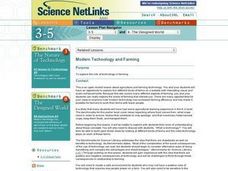Curated OER
Food Safety at the Grocery Store
Students study the connection between food spoilage and temperature control. They determine the difference between expiration, sell-by, and use by date on food. They investigate food safety practices to look for when food shopping.
Curated OER
Keeping Milk Fresh
Young scholars identify the risks of spoilage and pathogens in fresh milk. They investigate the farmer's role in keeping milk safe to drink and identify safety procedures used in dairy farming.
Curated OER
Don’t Cry Over Spoiled Milk!
Seventh graders explore how milk spoils over time. In this biology lesson plan, 7th graders discover how pH changes as microorganisms enter the food and multiply. They explain the benefits of pasteurization process.
Curated OER
How Can You Prevent Spoilage?
Middle schoolers complete laboratory activity to discover what temperature is most effective in prohibiting bacterial growth in two percent milk. Students then write lab report detailing findings.
Curated OER
Modern Technology and Farming
Learners explore agriculture by conducting a technology conversation in class. In this food system lesson, students identify the path of food from farm to plate and view a virtual farm on the Internet. Learners complete a farming...
Curated OER
Apple Science
Sixth graders explore agriculture by viewing a fruits and vegetables video clip. In this apple characteristics lesson, 6th graders discuss how fruits and vegetables deteriorate after being exposed to oxygen and identify methods to defend...
Curated OER
Mold
Students explore mold, the different types and the health risks that they pose. In this mycelium lesson students grow different molds and see which type of foods mold the fastest.
Curated OER
Who's Coming to Lunch: A Study of Mold Growth
Students participate in an experiment to determine where fungi and molds are formed, and create graphs documenting fungal growth.
Curated OER
Honey Bunches of Oats
Students explore a variety of crops that are used in our food products utalizing a box of the cereal, Honey "Bunches of Oates." Percentages of each of the three different kinds of flakes present are calculated.
Curated OER
"Keep it cool"
Students comprehend the importance of keeping cold foods cold. They identify the proper way to install and read a fridge thermometer. Students develop the ability to maintain a clean fridge at home.
Curated OER
Eggstra Safe Eggs
Students study about the bacteria that grow in eggs. They examine what farmers do to keep eggs safe such as providing clean environments in the chicken house.
Curated OER
Hand Washing: I can handle it!
Students wash cinnamon off of their hands in a variety of ways to learn proper ways to disinfect. In this washing hands lesson plan, students use water, soap, cooking spray, and other ingredients to wash hands and talk about the results.
Curated OER
The Designed World
Students visit a school or public library and study how information is organized. For this information management lesson, students answer a group of questions about the organizational method of the library. Students then practice sorting...
Curated OER
Chemical Changes by Gems
Seventh graders observe that heat is produced when two substances are combined. They brainstorm how, and then experiment to find out which of two chemicals created the heat.
Curated OER
A Breath of Fresh Air! Oxygen Tolerance in Bacteria
Students explore and research what pork and beans, gangrene and denitrification have in common. They summarize that they all are the result of anaerobic bacterial action. Students analyze the chemical processes that are carried out by...
Other popular searches
- Food Spoilage Experiment
- Food Spoilage and Prevention
- Bacteria Food Spoilage
- Food Spoilage Article
- Food Spoilage of Ceam
- Food Spoilage of Cam
















